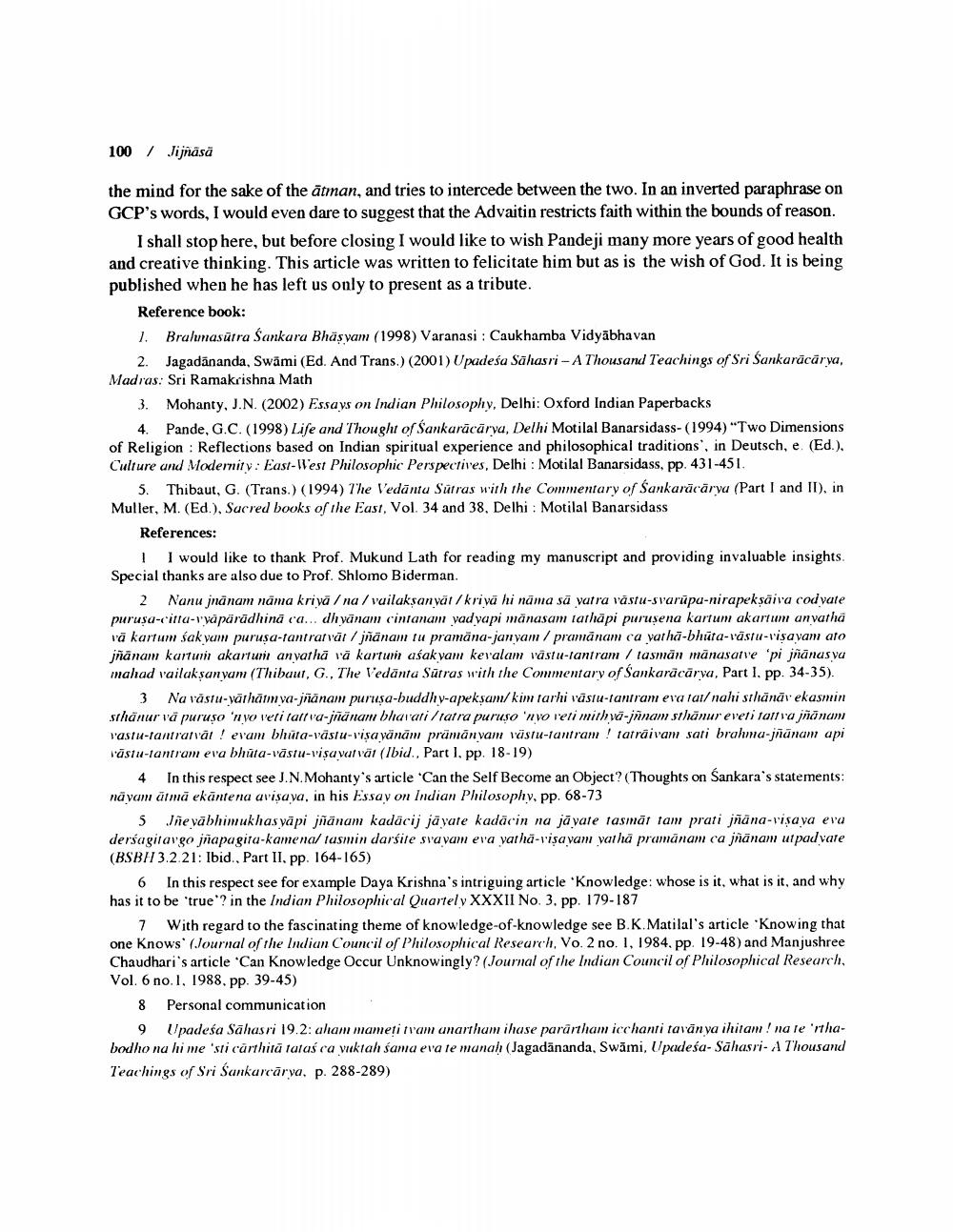________________
100
Jijnäsä
the mind for the sake of the ātman, and tries to intercede between the two. In an inverted paraphrase on GCP's words, I would even dare to suggest that the Advaitin restricts faith within the bounds of reason.
I shall stop here, but before closing I would like to wish Pandeji many more years of good health and creative thinking. This article was written to felicitate him but as is the wish of God. It is being published when he has left us only to present as a tribute.
Reference book: 1. Bralumasūtra Sankara Bhäsyam (1998) Varanasi : Caukhamba Vidyābhavan
2. Jagadānanda, Swami (Ed. And Trans.) (2001) Upadesa Sahasri - A Thousand Teachings of Sri Sankarācārya, Madras: Sri Ramakrishna Math
3. Mohanty, J.N. (2002) Essays on Indian Philosophy, Delhi: Oxford Indian Paperbacks
4. Pande, G.C. (1998) Life and Thought of Sankarācārya, Delhi Motilal Banarsidass-(1994) "Two Dimensions of Religion : Reflections based on Indian spiritual experience and philosophical traditions, in Deutsch, e. (Ed.). Culture and Modernity: East-West Philosophic Perspectives, Delhi : Motilal Banarsidass, pp. 431-451.
5. Thibaut, G. (Trans.) (1994) The Vedāntu Sūtras with the Commentary of Sankarācārya (Part I and II), in Muller, M. (Ed.), Sacred books of the East, Vol. 34 and 38, Delhi : Motilal Banarsidass
References:
1 I would like to thank Prof. Mukund Lath for reading my manuscript and providing invaluable insights. Special thanks are also due to Prof. Shlomo Biderman.
2 Nanu jnanam nama kriva / na/vailaksanvāt/kriva hi nāma sā vatra vastu-svarūpu-nirapeksaiva cod vate purusa-citta-vapärādhinä сa... dhyanam cintanam vad yapi mănasam tathāpi puruṣena kartum akartum an vatha vā kartum sak vam puruşa-tantralvāt / jñānam tu pramāna-janyam/ pramānam ca vatha-bhūta-lāstu-visayam ato jñānam kartuin akartun anyathā vā karturi aśak vam keralam vastu-tantram / tasmān mānasatve 'pi jñānusya mahad vailaksan yam (Thibaur, G., The Vedānta Sūtras with the Commentary of Sankarācārva, Part 1, pp. 34-35).
3 Na vastu-vāhām va jnanam purusa-buddhv-apeksam/kim tarhi vastu-tantram eva tar/ nahi sthänāvekasmin sthānur vă puruso nyo veti tallva-jntänan bharati /tatra puruso 'n vo reli mith vä-janam sthänur eveli tantra jñānam vastu-tantralvai ! evam bhuta-vastu-visa vänām prūmān vam västu-tantram ! taträivam sati brahma-jñānam api tāstu-tantram eva bhūta-vastu-visavat vai (Ibid., Part 1, pp. 18-19)
4 In this respect see J. N. Mohanty's article 'Can the Self Become an Object? (Thoughts on Sankara's statements: nayam almā ekāntena avisava, in his Essay on Indian Philosophy, pp. 68-73
5 Jñe vābhimukhas yāpi jānam kadācij jāyate kadăcin na jā vate tasmāt tam prati jñāna-Vişava eva derśagitavgo jñapagita-kamena/ tasmin darsite sva vam eva vatha-visa vam vai hä promānam ca jnanam ut pad vate (BSBH 3.2.21: Ibid., Part II, pp. 164-165)
6 In this respect see for example Daya Krishna's intriguing article Knowledge: whose is it, what is it, and why has it to be "true"? in the Indian Philosophical Quartel y XXXII No. 3, pp. 179-187
7 With regard to the fascinating theme of knowledge-of-knowledge see B.K. Matilal's article .Knowing that one knows (Journal of the Indian Council of Philosophical Research, Vo. 2 no. 1, 1984. pp. 19-48) and Manjushree Chaudhari's article 'Can Knowledge Occur Unknowingly? (Journal of the Indian Council of Philosophical Research, Vol. 6 no. 1, 1988, pp. 39-45)
8 Personal communication
9 Upadesa Sāhasri 19.2: aham mameti tvam anartham ihase parartham icchanti tavānya ihitam! na le 'rthabodho na hi me 'sti carthitä tataś ca vuklah sama eva le manah (Jagadānanda, Swāmi, Upadeśa- Sāhasri- A Thousand Teachings of Sri Sankarcārya, p. 288-289)




